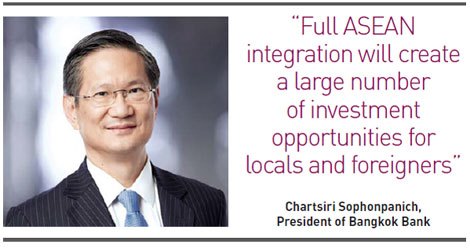An efficient, competitive sector

More than a decade of reform has made Thailand's financial services industry a regional leader
The Asian crisis of the late 1990s provided a much-needed opportunity to completely revamp Thailand's financial system, which in turn has provided the foundations for sustained growth over the last two decades, creating Southeast Asia's second-largest economy.
In 1998, Thailand completely overhauled its financial sector, mainly by restructuring debt and reforming its regulatory framework. Chartsiri Sophonpanich, the president of Bangkok Bank Public Limited, notes: "That process helped us to make many adjustments that are important for our business today and that will be key for the future. We also faced up to the challenge of the Asian financial crisis in the late 1997, which we had to go through, and we also adopted many new practices that would ensure that we would be well run and well managed, especially on the risk management aspect."
The Bank of Thailand's two-phase Financial Sector Master Plan has also focused on improving the financial system's overall efficiency. The plan led to greater competition, reduced costs, expanded access to financial services, and has seen the development of more sophisticated financial markets.
Last year saw the introduction of Basel III, an international agreement aimed at helping banks resist times of external stress by giving them stronger capital bases, better liquidity positions, and more comprehensive risk management. Today, the capital position of Thai banks is robust, while the industry's longer-term strength will continue to benefit from broader access to financing.
Thanks to more than a decade of financial reforms, the impact of the global financial crisis of the last five years on the Thai economy has been very limited. Furthermore, the funding structure of Thai banks and the low exposure of the Thai banking sector to subprime assets have helped insulate it from tight liquidity conditions abroad.
By 2010, the Thai economy was on a firm path to recovery, supported by fiscal stimulus, low interest rates, and a fully functioning banking sector. Lessons from the global financial crisis point clearly to the importance of having a sound and resilient financial system to prevent the risk of crisis and help the economy adjust to shocks.
The key issue for Thailand now is how to adapt to the new global regulatory process without harming economic recovery, while at the same time ensuring the finance industry contributes to economic growth. Important in this context is the role the financial system will play in promoting domestic demand as a key engine for growth, as well as the task of successfully transforming the country's high rate of savings into productive investment.
In an era of increasing globalization, a country's socioeconomic growth hinges on the strength of its regional ties. Each ASEAN member is still working to implement the AEC's agreements and protocols. Thailand is no different. Increased understanding and awareness of the AEC within the private and public sectors are helping a smooth integration into the organization. But continued economic success and a solid regulatory backbone mean that Thailand will remain a distinct force even as Southeast Asia converges.
With steady economic development and strong support industries, Thailand's output has grown and diversified rapidly both in long-established and newly emerging industries.
The country is well on its way to becoming a knowledge-based economy with increased productivity, the manufacturing of high valueadded products, and that has unleashed the creativity of the Thai people. Particularly in the agricultural sector, the nation has moved away from being a mere supplier of raw materials to a manufacturer of processed foods that compete on a global level. In the automotive industry as well, Thailand is enhancing its production capacity to service the needs of an industry that is well on the way to being ranked 10th in the world.
Sophonpanich says the free movement of labor in the AEC will improve skills throughout the region, helping Thailand retain its position as an industrial hub and become that knowledge-based economy. Successive Thai administrations have worked to ensure an adequate supply of highly-educated and skilled labor. Thailand is basing its development on science, technology, and innovation. "I think the emphasis on greater spending on research, development and on higher standard of practices are quite important parts. In some of these we might be still behind, but I think that is a critical part of the future in which both government and private sector have been working on," says Sophonpanich.
Thailand's production system is shifting away from a dependence on natural resources, capital, and labor with low productivity, to a focus on knowledge, science and technology with high productivity.
"Opportunities and challenges are everywhere, so it is important to aspire to improve. With knowledge, we will be able to take advantage of the available opportunities to stay competitive," says Sophonpanich, "Aspiration is important because it is a driving force".

(China Daily European Weekly 07/04/2014 page13)
Today's Top News
- New engine powers cargo drone expansion
- China to boost intl cooperation on green tech
- Factory activity sees marginal improvement in November
- Venezuela slams US' 'colonial threat' on its airspace
- Xi: Strengthen cyberspace governance framework
- Takaichi must stop rubbing salt in wounds, retract Taiwan remarks






























